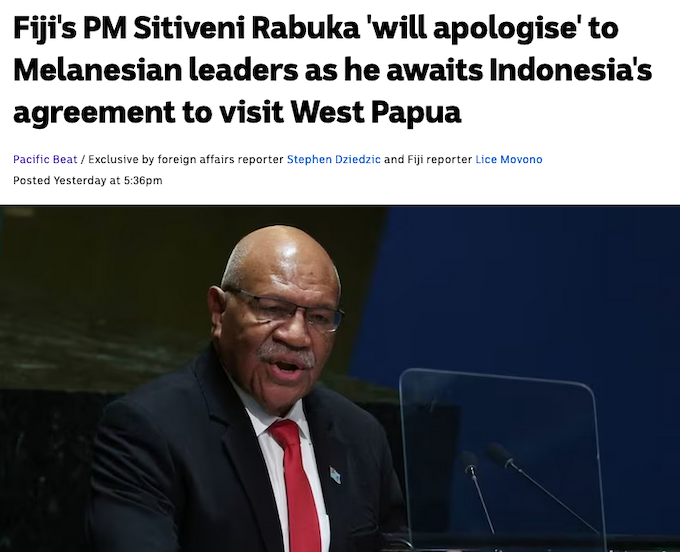
By Lice Movono and Stephen Dziedzic of ABC Pacific Beat
Fiji’s Prime Minister, Sitiveni Rabuka, says he will “apologise” to fellow Melanesian leaders later this month after failing to secure agreement from Indonesia to visit its restive West Papua province.
At last year’s Pacific Islands Forum (PIF) leaders meeting in Cook Islands, the Melanesian Spearhead Group appointed Rabuka and PNG Prime Minister James Marape as the region’s “special envoys” on West Papua.
Several Pacific officials and advocacy groups have expressed anguish over alleged human rights abuses committed by Indonesian forces in West Papua, where an indigenous pro-independence struggle has simmered for decades.
Rabuka and Marape have been trying to organise a visit to West Papua for more than nine months now.
But in an exclusive interview with the ABC’s Pacific Beat, Rabuka said conversations on the trip were still “ongoing” and blamed Indonesia’s presidential elections in February for the delay.
“Unfortunately, we couldn’t go . . . Indonesia was going through elections. In two months’ time, they will have a new substantive president in place in the palace. Hopefully we can still move forward with that,” he said.
“But in the meantime, James Marape and I will have to apologise to our Melanesian counterparts on the side of the Forum Island leaders meeting in Tonga, and say we have not been able to go on that mission.”
Pacific pressing for independent visit
Pacific nations have been pressing Indonesia to allow representatives from the United Nations High Commissioner for Human Rights to conduct an independent visit to Papua.
A UN Human Rights committee report released in May found there were “systematic reports” of both torture and extrajudicial killings of indigenous Papuans in the province.
But Indonesia usually rejects any criticism of its human rights record in West Papua, saying events in the province are a purely internal affair.
West Papua Resistance Leader, Victor Weimo: I must thank the colonialists for continuously teaching us to aspire to true humanity by means of rebellion. pic.twitter.com/h9n4rN9yyN
— Sina Brown-Davis سينا 🔻🇵🇸 🇳🇨 (@uriohau) December 1, 2022
Rabuka said he was “still committed” to the visit and would like to make the trip after incoming Indonesian president Prabowo Subianto takes power in October.
The Fiji prime minister made the comments ahead of a 10-day trip to China, with Rabuka saying he would travel to a number of Chinese provinces to see how the emerging great power had pulled millions of people out of poverty.
He praised Beijing’s development record, but also indicated Fiji would not turn to China for loans or budget support.
“As we take our governments and peoples forward, the people themselves must understand that we cannot borrow to become embroiled in debt servicing later on,” he said.
“People must understand that we can only live within our means, and our means are determined by our own productivity, our own GDP.”
Rabuka is expected to meet Chinese president Xi Jinping in Beijing towards the end of his trip, at the beginning of next week.
Delegation to visit New Caledonia
After his trip to China, the prime minister will take part in a high level Pacific delegation to Kanaky New Caledonia, which was rocked by widespread rioting and violence earlier this year.
While several Pacific nations have been pressing France to make fresh commitments towards decolonisation in the wake of a contentious final vote on independence back in 2021, Rabuka said the Pacific wanted to help different political groups within the territory to find common ground.
“We will just have to convince the leaders, the local group leaders that rebuilding is very difficult after a spate of violent activities and events,” he said.
Rabuka gave strong backing to a plan to overhaul Pacific policing which Australia has been pushing hard ahead of the PIF leaders meeting in Tonga at the end of this month.
Senior Solomon Islands official Collin Beck took to social media last week to publicly criticise the initiative, suggesting that its backers were trying to “steamroll” any opposition at Pacific regional meetings.
Rabuka said the social media post was “unfortunate” and suggested that Solomon Islands or other Pacific nations could simply opt out of the initiative if they didn’t approve of it.
“When it comes to sovereignty, it is a sovereign state that makes the decision,” he said.
Republished with permission from ABC Pacific Beat.













































